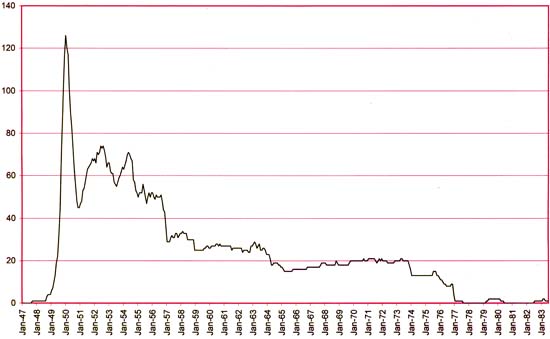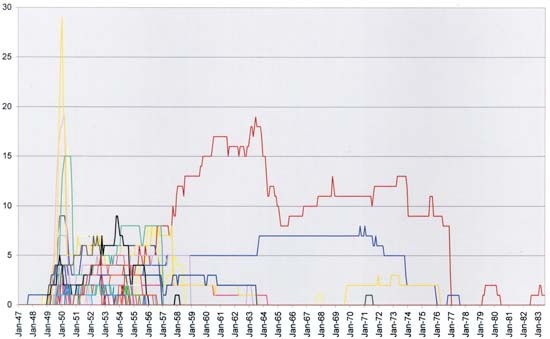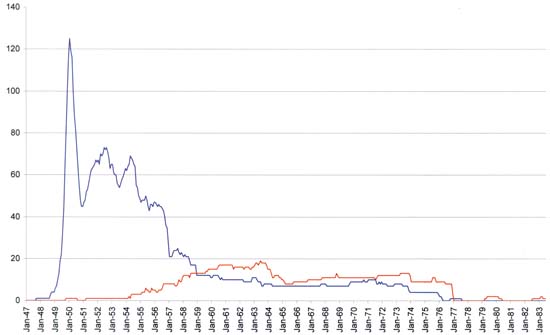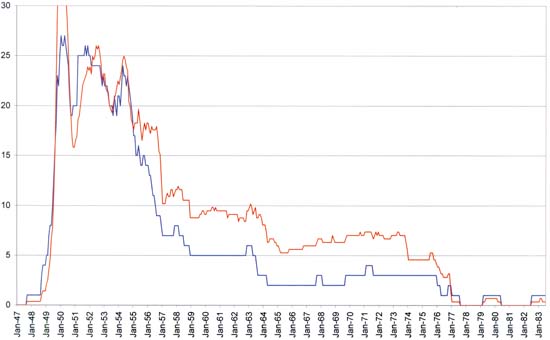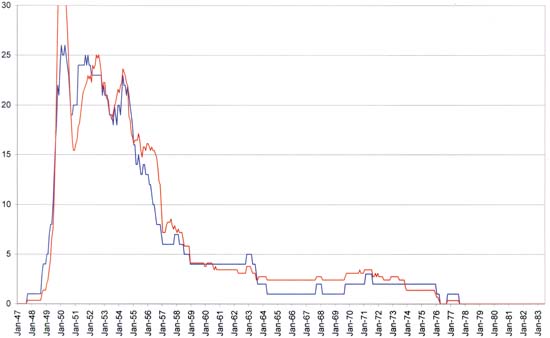“Fredric Wertham and the Critique of Mass Culture” by Bart Beaty (2005) is out of print but still easily found in the used book market. I do not remember where I heard of this book before, but I understood it was a defense of Fredric Wertham’s “Seduction of the Innocent”. By the time I finished reading that book I simply could not understand how anybody took Wertham’s seriously. So I proceeded to read Beaty’s book with much interest.
Beaty had a specific audience in mind when he wrote “Fredric Wertham and the Critique of Mass Culture” but it was not comic book fans. Rather it was for the field of media studies. I fully admit I know nothing about media studies but Beaty provides enough background material that I had no trouble understanding what he is writing about. According to Beaty media studies has two basic approaches to perform their investigations; surveys and laboratory studies. Wertham’s method of using clinical studies occupied neither of these methodologies. Consequently Wertham and “Seduction of the Innocent” has been ignored by those involved in the media field. On page 5 of the introduction Beaty quotes Joseph Klapper (“The Effects of Mass Communications”, 1960):
Wertham is not generally regarded, however, as having substantiated his very extreme views. Thrasher (1949), for example is typical of the critics in pointing out that Wertham provides no description of his samples of comic books or of human cases, apparently deals only with a small and highly deviant minority of both, provides no description of his case study techniques, uses no control groups, and, in short, provides no acceptable scientific evidence for his ascription of comic book influence.
(I have added the emphasis to the word “apparently”). Beaty’s comment about Klapper’s statement was (page 5):
While the substantive disagreement between Frederic M. Thrasher and Wertham on the nature and quality of Wertham’s proof cited by Klapper will be addressed specifically in Chapter 4, of greater importance at this point is the use of the term apparently in reference to “Seduction of the Innocent”. It suggests that Klapper had not read Wertham’s text and used Thrashers’s denunciation of it as the basis of his opinion.
I think Beaty has completely misread Klapper. If Klapper truly had not read SOTI then I would expect the word “apparently” to be associated with Wertham and thereby cover all the following items. Instead “apparently” is found in the middle of a list of comments indicating that it is “deals only with a small and highly deviant minority of both” that is apparent. In SOTI Wertham only gave a cursory description of where his subjects (the children) of his clinical studies came from. From my reading of SOTI I had concluded that it was not a balanced sample but it is hard to be sure given what little information Wertham provides and so the use of the word “apparently” is appropriate. The same can be said of Wertham’s study of the comics themselves. I do not know if in fact Klapper had read SOTI, but nothing in his statement convinces me he has not. More importantly Beaty’s misreading had led him to ignore concerns raised about Wertham’s data.
Beaty reviews a number of his opponents who were critical about Wertham’s data. For example according to Beaty Norbert Muhlen wrote (page 153):
…despite the lack of reliable data as to their circulation and influence on youthful minds…
But Beaty was more interested in comparing Muhlen’s politics with that of Wertham and does not discuss Muhlen’s questioning of Wertham’s data. This seems to be a recurring pattern throughout Beaty’s book. A number of Wertham’s critics had voiced reservations about the validity of Wertham’s data but Beaty repeatedly does not address the issue. In his introduction Beaty promised that “the nature and quality of Wertham’s proof … will be addressed specifically in Chapter 4.” Chapter 4 does include a careful review of SOTI but in fact Beaty does not show that Wertham’s data was scientifically valid.
Beaty provides some historical background in this book both on Wertham. This information was particular interesting as it answered some questions that arose from my reading of SOTI. Since the Comic Code Authority was established after Wertham’s book was published I had wondered how Wertham felt about it. As I suspected Wertham was not very pleased with the Comic Code. Towards the end of SOTI, Wertham had some favorable things to say about the then new media television. In Wertham’s view there were some deficiencies but he blamed that on the influence of comic books. Knowing that even after the Comic Code violence on television did not substantially decrease, I originally suspected that Wertham would end up critical of TV as well. Sure enough Beaty confirms this and Wertham even wrote a book condemning television that was never published. When I completed my reading of SOTI I felt that Wertham’s book was so obviously flawed and poorly written that I was amazed that people were taken in by him. I knew that the book received lots of publicity and reviews but I could not help but wonder whether anybody had actually read it. Well according to Beaty, Wertham’s agent reported that despite lots of good reviews sales were low. The agent surmised that most people felt that they already knew the contents and did not need to read it.
The conclusion of this book is rather surprising. A conclusion should take what has been discussed in the book (perhaps even summarize it) and reach some general observations. What is not expected are discussions that extend beyond the subject matter presented previously in the book. Unfortunately the admirable objective writing of the rest of the book is abandoned in the conclusion. Criticism of Wertham by comic book fans was not discussed previously but occupies much of the conclusion. It is not just that I disagree with many of his observations found there, it is that they are not as thoroughly discussed nor as well argued as the rest of the book. As I remarked earlier, comic fans were not the intended audience for this book and much of what Beaty writes consists of little more then attacks. For example this comment by Beaty (page 197):
In what is possibly the most horrendously inappropriate overstatement ever made on this subject, comic book writer Mark Evanier has called Wertham “the Joseph Mengele of funnybooks”.
Evanier remark was from “Wertham Was Right” a book collecting essays most of which were originally written for The Comic Book Buyer’s Guide. All the essays have an element of humor to them and it is hard to believe that any reader could miss that. I am sure that Evanier does not seriously believe that Wertham’s misdeeds were truly the equivalent of Dr Mengele’s. More importantly I also believe that Beaty was wrong to describe this as “the most horrendously inappropriate overstatement”. That dubious distinction surely belongs to the following:
What in a few words is the essential ethical teaching of crime comics for children? I find it well and accurately summarized in this brief quotation:
It is not a question of right, but of winning. Close your heart against compassion. Brutality does it. The stronger is in the right. Greatest hardness. Follow your opponent till he is crushed.
These words were the instructions given on August 22, 1939, by a superman in his home in Berchtesgaden to his generals, to serve as guiding lines for the treatment of the population in the impending war on Poland.
This was written by Wertham in SOTI (pages 95 – 96) and was clearly made without a trace of humor. Apparently Bart Beaty had no problem with Wertham’s statement as it is never mentioned in his book.
For me, and it would seem for those in media studies, the greatest difficulty in repairing Wertham’s image centers on questions about his data. Unless it can be shown that Wertham’s use of clinical studies was sound in both theory and practice, there have been no reason to accept his conclusions let alone act on them. That Beaty realized this is shown by his statement (page 136):
To make the argument that action against comic books was necessary, however, Wertham necessarily had to demonstrate that they were, like the tubercle bacilli, a harmful factor and not simply a scapegoat.
Beaty’s primary means of attempting to do this is the review of previous commentary by Wertham and his critics. The problem with this approach is that if the original discussions ended with the general neglect of Wertham’s “Seduction of the Innocent” why should a new review, however well presented, come to any other conclusion? Beaty also gives much significance to the fact that Wertham’s critics never provided scientific evidence to disprove Wertham. This is an argument that Wertham also makes in SOTI. Both Wertham and Beaty have got this wrong, the onus is on Wertham to scientifically prove his position, which he never did. At most, Wertham and his critics were equally unscientific and there is no reason to accept any of their arguments as persuasive. In the conclusion, Beaty remarks that comic fans are just not qualified to evaluate whether Wertham’s data is scientific. This is wrong on two accounts. Many, including myself, as laypeople, could easily be fooled into accepting, as scientific, evidence that an expert could equally easily dismiss. That does not, however, imply that we laypeople are unable to recognize the absence of scientific data. But even if it is assumed that laypeople are not qualified, not all Wertham’s critics would be described as laypeople. Beaty’s own account in this book provides a number of critics who concluded that Wertham had not presented scientific evidence. Beaty has failed to shown them wrong. Wertham never presented his studies in a scientific journal or publication so the data was never subjected to any peer review. Under these conditions how could Wertham’s analysis possibly be called scientific?
I do not believe it is necessary that I agree with an author in order to find a book rewarding. Provide a well thought out argument along with a good presentation and I will be pleased even if unconvinced. Beaty certainly has done that throughout this book with the exception of the conclusion. While I found “Fredric Wertham and the Critique of Mass Culture” very engaging I believe Bart Beaty completely failed in his objective of repairing Wertham’s image. There seems no justification for accepting “Seduction of the Innocent” as a useful resource. Therefore Fredric Wertham’s book should remain discredited and nothing more then a cautionary footnote to history.



